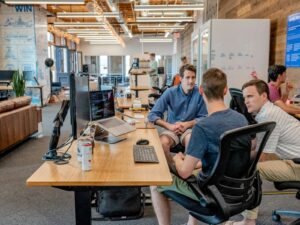The Role of Employee Experience in Driving Success
Gaining a Competitive Edge Through New Work Models in Swiss Businesses
Gaining a competitive edge through new work models in Swiss businesses has become a crucial strategy for companies aiming to adapt to changing market demands and modern workplace expectations. Swiss organizations, known for their precision and innovation, are increasingly embracing flexible work models that cater to the evolving needs of their workforce. From remote work to hybrid setups, these new models offer employees the opportunity to work more autonomously, which, in turn, enhances productivity and job satisfaction.
Incorporating new work models is not merely a response to global trends, but a well-calculated move to foster a dynamic and resilient workforce. Swiss businesses are recognizing that by offering employees more flexibility, they create an environment that promotes creativity, collaboration, and innovation. As a result, organizations can attract top talent, retain key employees, and position themselves as leaders in their industries.
A critical aspect of this shift is the enhanced employee experience that accompanies new work models. Swiss companies are investing in modern tools, digital platforms, and training programs to ensure their employees have the resources needed to thrive in these flexible environments. By prioritizing employee well-being and engagement, businesses are not only driving individual performance but also improving overall organizational success.
The Impact of Remote and Hybrid Work on Employee Engagement
The rise of remote and hybrid work has transformed the way employees engage with their organizations. For Swiss businesses, adopting these models has proven to be a powerful tool in enhancing employee experience and fostering deeper connections between staff and company goals. Remote work, once seen as a temporary solution during crises, has evolved into a sustainable model that provides employees with greater work-life balance, autonomy, and flexibility.
Employee engagement is directly influenced by how empowered individuals feel in their roles. With new work models, Swiss companies are giving employees more control over their schedules, allowing them to manage their personal and professional lives more effectively. This autonomy not only boosts morale but also encourages employees to take ownership of their tasks, leading to higher levels of engagement and productivity.
Moreover, hybrid work models combine the benefits of both in-person and remote work, offering employees the best of both worlds. By allowing employees to split their time between home and the office, Swiss businesses are creating a flexible yet structured environment that supports collaboration while maintaining the independence of remote work. This balanced approach leads to increased job satisfaction, lower turnover rates, and a more engaged workforce.
Leadership’s Role in Implementing New Work Models Successfully
The success of new work models in Swiss businesses largely depends on leadership’s ability to adapt and champion these changes. Leaders must recognize that the shift to flexible work is not just about implementing new policies but about fostering a culture of trust, transparency, and collaboration. By actively promoting and supporting these work models, leaders can ensure that employees feel valued and empowered.
Effective leadership in the context of new work models involves clear communication, especially when setting expectations for performance and productivity. Swiss leaders are increasingly utilizing digital tools to maintain open lines of communication with their teams, ensuring that employees have the guidance and support they need to succeed, regardless of where they are working. Regular check-ins, virtual meetings, and feedback sessions help keep teams aligned and engaged, reinforcing a sense of community within the organization.
Furthermore, leadership must focus on fostering a sense of belonging among remote and hybrid teams. While employees may be working from different locations, it is essential for leaders to create opportunities for team-building, knowledge-sharing, and collaboration. By emphasizing a strong company culture, Swiss businesses can bridge the gap between remote workers and office-based employees, ensuring that everyone feels connected and engaged with the company’s mission.
Employee Experience as a Competitive Advantage
The Role of Technology in Enhancing Employee Experience
Technology plays a pivotal role in supporting new work models and enhancing the overall employee experience. For Swiss businesses, investing in advanced digital tools and platforms is key to maintaining productivity and ensuring seamless communication across remote and hybrid teams. Cloud-based collaboration platforms, project management tools, and video conferencing software have become integral components of the modern workplace, enabling employees to work efficiently from any location.
Moreover, technology-driven solutions such as AI-powered analytics and performance tracking tools allow Swiss companies to monitor employee engagement, productivity, and well-being in real time. These insights enable organizations to make data-driven decisions that improve employee experience, from offering personalized learning and development opportunities to optimizing work processes. By leveraging technology, Swiss businesses are gaining a competitive edge by creating a more agile and responsive workforce.
In addition to enhancing productivity, technology also plays a role in supporting employee well-being. Wellness apps, mental health resources, and virtual fitness programs are becoming standard offerings in many Swiss companies, reflecting a growing recognition of the importance of holistic employee care. By integrating these resources into their work models, businesses are demonstrating their commitment to employee health, which in turn strengthens engagement and loyalty.
Building a Strong Company Culture in a Flexible Work Environment
One of the challenges of adopting new work models is maintaining a strong company culture, especially when employees are working remotely. For Swiss businesses, culture is a critical component of their identity and success, and ensuring that it remains intact is essential as they embrace flexible work environments. To overcome this challenge, companies must focus on fostering a sense of community and belonging, even in a decentralized work model.
Virtual events, online workshops, and team-building activities are some of the ways Swiss companies are creating opportunities for employees to connect and engage with one another. Regular communication and collaboration are also key to maintaining a cohesive culture. By encouraging open dialogue and providing platforms for employees to share their ideas and feedback, businesses can create an inclusive and supportive work environment.
Additionally, leaders play a crucial role in reinforcing company values and maintaining cultural cohesion. By setting the tone for the organization and leading by example, leaders can inspire employees to stay connected to the company’s mission and vision, regardless of their physical location. A strong company culture not only enhances employee engagement but also serves as a competitive differentiator in attracting top talent.
Conclusion: The Future of Work in Swiss Businesses
The adoption of new work models has positioned Swiss businesses to gain a competitive edge in a rapidly changing business landscape. By focusing on enhancing the employee experience, embracing remote and hybrid work, and leveraging technology, Swiss companies are creating more agile, innovative, and engaged workforces. The role of leadership in guiding these changes and maintaining a strong company culture is critical to ensuring the long-term success of these work models.
As businesses continue to adapt to evolving workplace dynamics, those that prioritize employee well-being and foster a culture of trust and collaboration will thrive. Swiss companies are at the forefront of this transformation, demonstrating that a focus on the employee experience can lead to enhanced performance, innovation, and sustained success.
—
#newworkmodels #swissbusiness #employeeexperience #businesssuccess #remotehybridwork #leadership #workplaceinnovation #engagement #digitaltransformation #futureofwork













